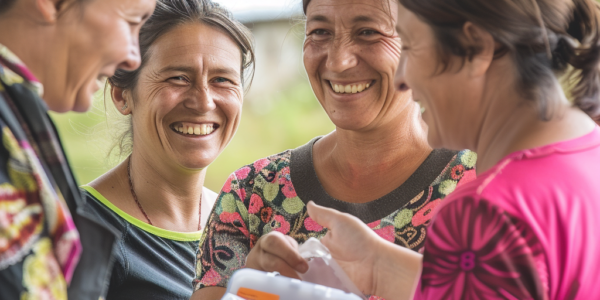USPSTF Recommends HPV Testing as Primary Cervical Cancer Screening for Women Over 30
The U.S. Preventive Services Task Force (USPSTF) has recommended high-risk HPV testing as the primary cervical cancer screening method for women aged 30 to 65, replacing the traditional Pap smear. This shift aims to enhance cancer detection and reduce cervical cancer incidence. Women in their 20s should continue with Pap smears every three years. The new guidelines also suggest self-collection options for HPV testing to improve participation. Healthcare providers are encouraged to discuss these changes with patients to promote informed health decisions.
Quad Cancer Initiative Unites Nations to Combat Cervical Cancer in Indo-Pacific
The Quad Cancer Initiative, launched by Australia, India, Japan, and the United States, aims to combat cervical cancer in the Indo-Pacific region through enhanced HPV vaccination, increased screening access, and improved treatment options. This collaborative effort addresses critical health disparities, focusing on prevention and early detection to save lives and improve women’s health outcomes.
Michigan Faces Low HPV Vaccination Rates Among Adolescents
Michigan is facing a troubling decline in HPV vaccination rates among adolescents, with only 44% of teens immunized. Experts stress the importance of effective communication between healthcare providers and parents to enhance awareness of the vaccine’s cancer-preventing benefits. As health advocates push for education campaigns, the need for immediate action is critical to protect young individuals from HPV-related cancers.
DIY kits could increase cervical-cancer tests by a million
Researchers estimate that over one million extra women could have life-saving cervical-cancer checks if the NHS adopted DIY testing kits. The self-testing trial results were described as fantastic, giving power to women. The kits, similar to Covid swabs, are sent to a lab for analysis. This innovative approach could help increase cervical cancer screening rates and reach women across different demographics.
Nova Scotia to Introduce At-Home HPV Testing Kits
Nova Scotia is set to introduce at-home HPV testing kits to improve accessibility to testing for individuals without primary care physicians. Doctor Robert Grimshaw of the Nova Scotia Health Cervical Cancer Screening Program has announced the anticipated rollout within the next two years. This initiative aims to streamline the testing process and encourage more individuals to undergo HPV screening, empowering residents to take proactive steps towards safeguarding their health.
Nigeria Introduces HPV Vaccine for Children in National Immunization Program
The Federal Government of Nigeria has introduced the Human Papillomavirus (HPV) Vaccine into the national immunization program targeting children aged nine to fourteen years old. Stakeholders are urged to raise awareness about the importance of the vaccine in preventing cervical cancer, a silent killer with long-term effects. The government is working to make the vaccine accessible to the targeted demographic to enhance disease prevention and public health among children in Nigeria.
Study Shows HPV Vaccine Benefits Men and Boys in Preventing Various Cancers
Discover the significant benefits of the HPV vaccine for men and boys in reducing the risk of head and neck cancers and other malignancies. A recent study examined over 3.4 million individuals, showcasing the long-term effectiveness of the vaccine in preventing HPV-related cancers. Learn how vaccination can mitigate the risk of various cancers affecting different parts of the body and the impact of HPV infections on head and neck cancers.
Kentucky Leads Effort to Increase HPV Vaccination Rates
Learn how Kentucky is leading the U.S. in efforts to increase HPV vaccination rates and prevent cervical cancer. With the HPV vaccine proven to be highly effective in preventing various cancers, including cervical cancer, researchers are working to raise awareness and improve vaccination rates among children to eliminate HPV-related cancers in the future.
Irregular Periods and Cervical Cancer: What Women Need to Know
Irregular periods can sometimes be the only warning sign of cervical cancer. Women must pay attention to their bodies and take note of any changes in their menstrual cycles, as irregular periods can be indicative of an underlying health issue like cervical cancer. Dr. Jyoti Mehta, MD Radiation and Clinical Oncologist at TGH Onco Life Cancer Centre, emphasizes the importance of actively monitoring and addressing changes in menstrual patterns to maintain reproductive health and prevent cervical cancer. Symptoms to watch out for include unusual discharge, abnormal vaginal bleeding, pelvic pain, discomfort during intercourse, and irregular periods. It is crucial for women to be aware of these symptoms and seek medical attention if they experience any signs of cervical cancer.
Transforming Health Care: Fighting Cervical Cancer in Marginalized Communities
Home-test kits and mobile labs for detecting cervical cancer are transforming health care in remote or marginalized communities. Magdalena Rothova, director of the Association for Culture, Education and Communication (ACEC) in Slovakia, is leading the charge to reduce deaths from cervical cancer in Europe. By empowering marginalized communities with the tools for early detection and intervention, initiatives like the PRESCRIP-TEC project are paving the way for improved cervical cancer outcomes in regions where access to traditional screening methods may be limited.










